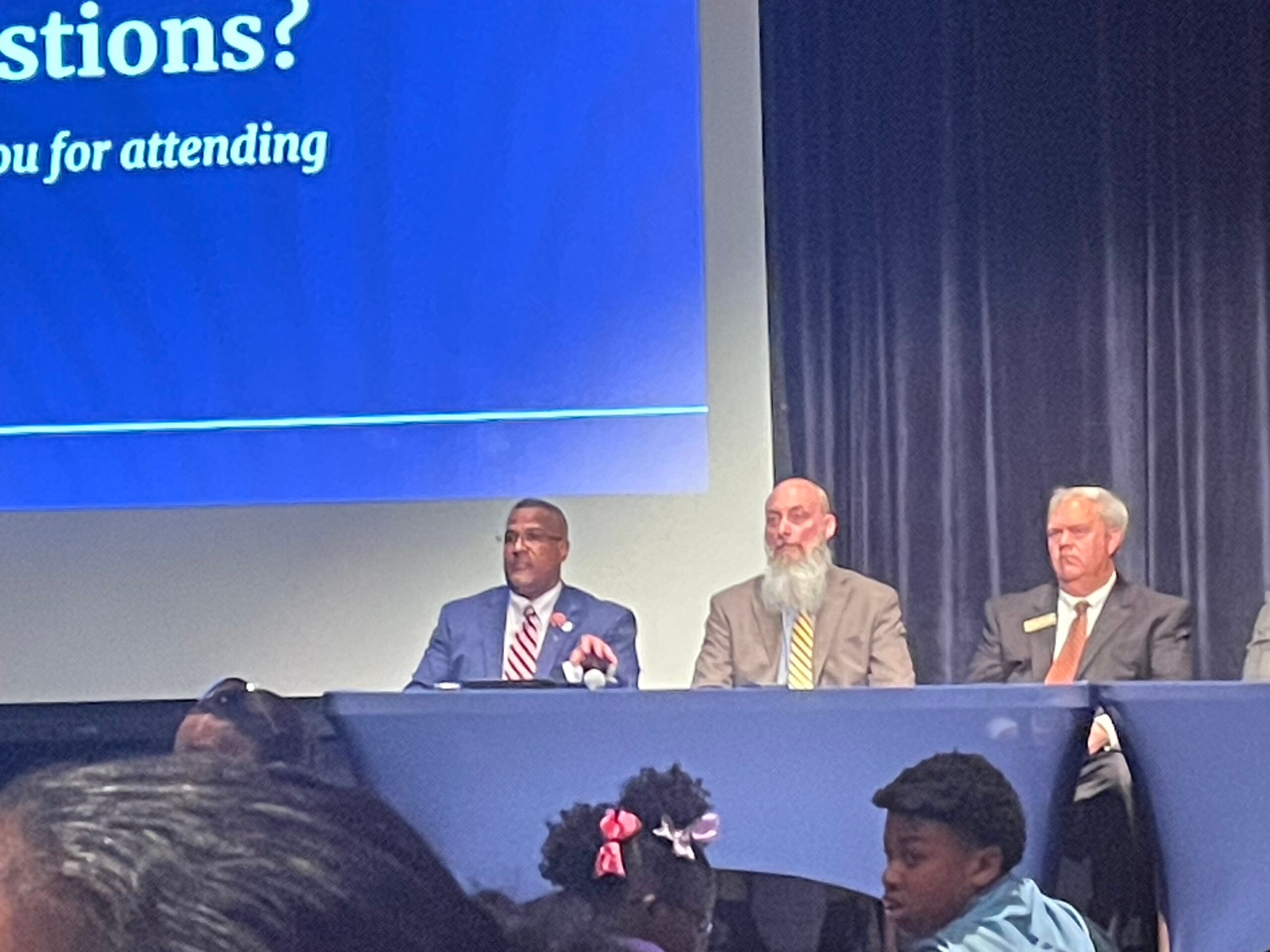The Columbia County School District held the latest session of its Let’s Talk informational series in the auditorium of Grovetown High School, Thursday evening.
The discussion forum invited the public to hear talks from panelists, mostly from the district police department, on school safety protocols and issues of bullying, drugs—particularly vaping—and gangs. Among the speakers were, Officer Christopher Knoeferl, Sgt. Lee Peck and Chief Gary Owens of the Columbia County School District (CCSD) Police Department, Columbia County Assistant District Attorney Todd Hughes, Director of Student Support Michael Johnson and Chief Judge Charles Evans.
Campus safety
Sgt. Peck, the district training officer, explained the measures the CCSD it has taken to maintain safety on district campuses, with a wide range of initiatives including standardized response procedures, increased training for faculty, staff and officers on how to respond in active shootings, attendants assigned to school parking lots, partnerships with the Georgia Emergency Management and Homeland Security Agency (GEMA) and even a tip line, 706-541-3600.
Chief Owens urged the public to report threats publicized on social media, without distributing the harmful posts.
“If you get a threat like this, or get a comment or a picture or something on one of the social media platforms, go to somebody in authority… or go to the student administrator and say, ‘This is what I’ve seen,’” said Owens. “Refrain from reposting that as a warning to other people, because that thing continues to keep on going and going and going.”
Bullying prevention
Johnson spoke on bullying prevention, starting by defining it as “unwanted aggressive behaviors by another youth or group of youths,” stressing a power imbalance between bullies and victims, and that offenses are repeated multiple times. Johnson also took care to distinguish this from rudeness, arguments, name-calling and discrete instances of a student pushing another.
He further noted that all staff are required to report incidents of bullying, to be investigated by the administration, and stressed that administrators are mandated to notify parents or guardians of students are a victims of, or who have committed, bullying.
Johnson, who is also the district’s lead hearing officer with the CCSD, outlined what he referred to as “progressive discipline,” the protocols in place to respond to bullying incidents, which range from loss of privileges, seat reassignments or detention to in-school or out of school suspense and, for grades 6 – 12, referral to the hearing officer.
Parental concerns
The panelists allowed for questions after their talks, which revealed concerns of some locals regarding the safety initiatives. Nicolette DeRamus told the panel that substitute teachers were not being instructed in the safety procedures that full-time faculty and staff are, saying, “As a sub, the training is not happening… Teachers are trained to lock and secure those doors when they hear a certain code come out over the intercom. We don’t know it… All classrooms are not created equal.”
Assistant Superintendent Penny Jackson told DeRamus that the district will take her comments into consideration to address the discrepancy.
Kristine Winning, the mother of a Columbia Middle School student, asked about the role administration plays during emergencies or threats. Johnson told her that all administrators have their own specific protocol for all emergency situations for a guide called the Red Book.
Winning then asked why students who are arrested for threats or other harmful behavior toward other students are allowed to return to school, as opposed to being sent to the Alternative School. Johnson emphasized due process, and the distinction between county law and school district’s rules.
“They are going to be given due process to present their case,” he said, referring to cases where students are arrested. Judge Evans weighed in, drawing on his experience as a juvenile court judge in both Richmond and Columbia Counties, noting that the latter is an independent court, rather than a “Department of Juvenile Justice court,” which, he said, “which gives us more freedom to maneuver than what we do and how we operate.”
Evans further explained that when officers elect to detain juveniles, males are transported to the Richmond County Youth Detention Center and females to the Wilkes Regional Youth Detention Center in Washington, Ga.
“They will listen to the facts, and they will listen to the crime that is determined to be proclaimed. They will make an initial detention decision,” said Evans. “That decision is based upon their years of experience and some limited guidelines.”
Evans went on to stress the parsing involved in determining the best course of action after arresting children, noting that, before attending the forum, he had signed paper to transfer a 16-year-old detainee—an alleged gang offender from Atlanta—to be tried as an adult.
“Remember, I’m a referee, but that does not mean that I haven’t an interest in advocating for justice, sure justice, to give out the help that’s needed for children that need the help, and also to address the serious events.”
Skyler Q. Andrews is a staff reporter covering business for The Augusta Press. Reach him at skyler@theaugustapress.com.











